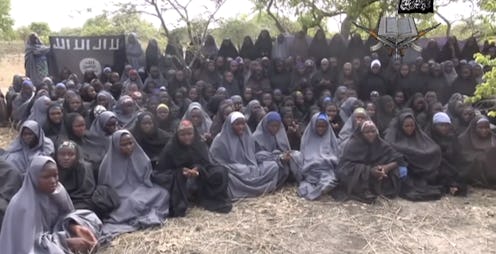News
These May Be The Missing Nigerian Girls

In a chilling video obtained by Agence France-Presse Monday, the leader of Boko Haram, Abubakar Shekau, announced he'd use the kidnapped Nigerian schoolgirls as a bargaining chip. If the Nigerian government agrees to release militant prisoners, said Shekau, then Boko Haram will free the more than 200 girls they captured April 14. This latest video, though yet to be authenticated, is the first that shows the schoolgirls unharmed and in seemingly good condition. However, their whereabouts remain unknown, and with the Nigerian government unlikely to compromise with a terrorist organization, their fate is still uncertain.
This latest development puts the schoolgirls in a dangerous hostage situation. In the video, Boko Haram leader Shekau says that Boko Haram's "brothers in arms," the rebel group's fellow militant fighters, must be released to attain the girls' freedom. Shekau does not provide any details as to which or how many prisoners he wants released, but seems to suggest an eye-for-an-eye approach. This would mean that a large-scale release of captured militants would be required for the return of the girls.
The rebel group has not made any previous demands about the schoolgirls. In the last video released, their announced plan was to sell the young women off as militant brides, some for as little as $12. Now, however, Boko Haram appears to be attempting a trade deal with the Nigerian government, which is already suspected of engaging in behind-the-scenes negotiations with the group. In the video, Shekau makes his position clear, saying,
We will never release them until our brethren are released...It is now four years or five years that you arrested our brethren and they are still in your prison.
The video also shows approximately 150 young women, all of whom are wearing full veils and praying in the 17-minute video. Boko Haram, whose purported purpose is to eradicate non-Islamic teachings in their country, have at least cosmetically eradicated traces of the girls' Western schooling. Education is often the most powerful tool Nigerian women can use to better their circumstances, but Shekau declares the group's Muslim teachings have "liberated" the girls: "These girls, these girls you occupy yourselves with... we have indeed liberated them. These girls have become Muslims."
At one point in the video, the girls are shown reciting “Al-Fatiha,” often one of the first prayers taught to Muslims, in Arabic. Of the three girls interviewed in the recording, two say that they are Christians who have since converted to Islam, while the other says she is Muslim. This makeup is reflective of the group as a whole, with the majority of the kidnapped girls thought to be Christian, though a few practice Islam.
While the video seems to show that the girls are safe and seemingly unharmed, this may make rescue efforts more difficult. Last week, Retired General Carter Ham, who until last year led the U.S. African Command, said that if the girls had dispersed and were being held by "less experienced, and perhaps less ideologically committed individuals," the kidnappers might be "affected by good hostage negotiation." However, if the girls were still under Shekau's control, Ham said, it would be unlikely that the rebel leader could be persuaded to release the girls without some sort of restitution.
The most recent demands are in line with Boko Haram's tactics, as they have demanded the release of prisoners in the past in exchange for their own hostages. But according to AFP, the Nigerian government has already refused the rebel group's offer. Latest reports from claim that when asked if the government would reject the possibility of negotiating with terrorists, Interior Minister Abba Moro told AFP, "Of course."
The Nigerian government has faced considerable anger and accusations from Nigerian citizens of moving too slowly and failing to exercise all possible resources in finding the captured schoolgirls. But even with the help of the U.S., France, Britain, and even China, a rescue mission will be difficult, particularly if Nigeria's neighbors like Niger, Chad and Cameroon do not offer their assistance. These surrounding areas are so critical because some girls may have already crossed Nigerian borders into foreign lands, and having the help of neighboring African countries will be crucial in returning the young women.
The girls are thought to be held in the Sambisa forest, where Boko Haram is based. Locals call the forest, previously a wildlife reserve that has since been overrun by more insidious inhabitants, the "evil forest," and it is known to house poisonous snakes and crustaceans in its vast depths. The remote forest is eight times the size of Yellowstone, and is virtually uncharted territory for most of those who will take part of a rescue mission for the kidnapped girls.
Image: AFP